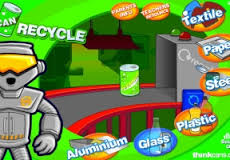Category Reading

The Rainforest: A Camp Lesson Plan
As mentioned in the previous post, The U.S. embassy in Ecuador holds an English immersion camp for scholarship high school students. A group of fellow PCVs are charged with presenting backgroud information on the rainforest for the 2016 camp. Here is the lesson plan, which may give you ideas for your own camp.

Recycling Facts, Games and Crafts
The U.S. embassy in Ecuador runs an English immersion camp, which has a distinct theme each time, for high-performing high schools students, who also receive scholarships for English lessons with a private institution. The theme for the spring 2016 camp, which will be held in the Mindo cloud forest, is our natural world and its conservation. PCV […]

Hybrid Listening Cloze and Info-gap Activity
English Teaching Forum recently published an article by Juan Pablo Zúñiga Vargas, an English teacher in Costa Rica. The submission outlines a hybrid activity that combines listening cloze with info-gap and integrates macro-and micro-language skills. Importantly, it allows students to play a more autonomous role in class.

TOEFL Reading Question Types
Ecuadorian PCV Elizabeth Sypher shares her teacher-training PowerPoint about the TOEFL reading section.

Seeing Healthy Answers
Kevin McCaughey’s article “Practical Tips for Increasing Listening Practice Time ” in English Teaching Forum (Vol. 53, No.1, 2015) points out that students often don’t get much listening time in what teachers think are listening-focused activities. He offers tips on managing classroom listening activities where teachers can “see it” happen. This lesson uses a healthy eating […]

Creating a New Civilization
This activity can focus on speaking and/or writing. It is a great opportunity for group work; students make decisions about the fate of 10 survivor candidates as the world reels from war, and humanity faces extinction!

Student Storytellers
StoryCorps is a nonprofit organization that records and archives on its website a wide variety of stories told by the protagonists, their families, and friends. The sometimes touching, funny, riveting, or surprising tales offer our TEFL and ESL students and fellow teachers insight into U. S. culture. Moreover, the recordings and transcripts provide written and […]

Synthesizing
Synthesizing is another critical skill that our students and teachers need to master to do well on tests and in the classroom.

Paraphrasing and Summarizing
This post in our series on academic skills provides an overview of paraphasing and summarizing, along with a worksheet for teacher and student practice.

Skimming and Scanning
Skimming and scanning are critical academic skills that our students and teachers need to succeed throughout their careers. This post is another in our series on acquiring or honing academic skills.

Taking Notes
Many TEFL PCVs teach TOEFL and various Cambridge exam prep courses. Acquiring or honing academic skills such as taking notes is critical to the candidate’s success on exam day; moreover, these skills aid our students throughout their academic lives and often afterward on the job. This post is one of a series on academic skills.

WH-Questions and Simple Present Tense Practice
The communicative approach to language learning is prioritized in Ecuador, and, therefore, we try to promote classroom speaking practice with our counterpart local teachers and their students. Our students don’t have many opportunities to interact with English visitors, even in the largest cities of Cuenca and Quito, so it’s important for PC TEFL volunteers to provide practice at school. In […]

Understanding the Speaker’s Attitude
The door to successful listening, especially understanding informal presentations and conversations, hangs on a number of hinges like utterances, useful expressions, idioms, pronunciation, tone of voice, facial expression and gestures (if video is available), and attitude. These components are often related and, as a whole, give listeners a clearer idea of what they have heard.

Vocabulary and Context Clues
ESL and EFL learners find many words they don’t understand in their reading. Rather than stopping to look up each new word in the dictionary, they can use context clues to guess the meaning of new vocabulary. This lesson, adapted from a Douglas Learning Centre handout, explains the clues students can use to ascertain meaning and become […]

Love on a Leash
While dogs, “man’s best friends,” have long occupied a special place in US homes, keeping a dog as a pet in Ecuador is a relatively new custom. Certainly dogs have worked in the fields for centuries, but many Ecuadorians and other peoples are unaware that dogs have a remarkable ability to bond with humans. This makes […]

Chance Encounters
This activity uses pictures of a wide range of people for whom students will write dialogues that might occur if the individuals had a chance meeting somewhere in the world. The lesson plan is adapted from one created by Allegra K. Troiano, Senior English Language Fellow (ELF), US Embassy.

Chicago Food Tour Cultural Exchange
We love food, especially food that stimulates and surprises! EFL students and teachers are usually surprised to learn that the US population comprises every nationality on Earth. Realizing how diverse our country is–waves of immigration have been our history–many EFL learners understand that our language varies across the nation, not to mention internationally. This lesson […]

Pastimes Mingle
In this activity and lesson plan, adapted from an article from the US Department of State’s English Teaching Forum 2014, No 2, students mingle and interact, in pairs and then with the rest of the class, as they discuss pastimes.

Vocabulary: a powerful weapon
Peace Corps Regional Volunteer Leader Nikki Rowley created two PowerPoints that show the importance of vocabulary and offer games to teach it in the classroom.

Idiomatic Expressions
Learning idioms is a challenge for any second language learner as they vary: by the country and even the region in which the language is spoken; over time and with new ideas and technologies; and by the context in which they are used. Students usually have a lot of fun ascertaining the meanings, and teachers can […]

Who Knows, Knows Competition
Ecuador promotes school festival weeks, where students have the opportunity to present artwork, theater, dance, sporting events, and English competitions! The game the English department devised this year for the spring festival is called “Who Know, Knows.” Middle school students formed classroom groups and competed with other classrooms to answer the questions on the PowerPoint, […]

Gratitude Tree
We “grew” a Thanksgiving tree on the school’s wall leading to the library. The tree, constructed of poster board, held hundreds of paper leaves on which students from many of our English classes had written words of gratitude or thanksgiving. This culminated a week of learning about Thanksgiving, using Teach Like a PCV resources such […]

Creating a Mini-book
In this presentation, Peace Corps Volunteer Jazzy Osh shows teachers how to plan and design mini-books for a classroom unit project.

Implement Projects in the Classroom
In this presentation, Peace Corps Volunteer Jazzy Osh tells teachers how to implement projects, specifically a mobile, in the classroom that help students meet specific objectives and learning goals. She also discusses the valuable skills student learn as they take on project responsibilities and, in doing so, help teachers manage the classroom more effectively.

Use Dialogues and Role Plays Effectively
Improving students’ speaking skills is one of the greatest challenges TEFL teachers face. We know that communication is a primary goal, yet our students have few opportunities to practice English outside the classroom, making dialogues and role plays essential to our toolbox. This presentation talks about the benefits of using these tools and how to […]

English Club Monster Mash
English clubs are part of the Ecuadorian curriculum, and, of course, many EFL teachers around the world start English clubs to give students an opportunity to have fun while learning the language. Successful club activities require planning and preparation and should have objectives, just as our lesson plans do. Here we offer some activites based on […]

Affixes
The objective of this presentation is to help teachers, and their students recognize and use the most common affixes– prefixes and suffixes– to increase their vocabulary and their understanding of academic texts.

Using Authentic Materials in the Classroom
This presentation discusses the benefits of using authentic materials and realia in different teaching contexts.

Vocab Scavenger Hunt
Using realia is a proven way to teach vocabulary, especially to beginners. Teachers can present the vocabulary in chunks of related objects, e.g., kitchen utensils, over a series of classes based on the class language learning level. The finale will be a scavenger hunt to review the vocabulary presented during the week or unit. This […]


